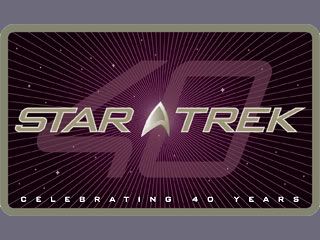This September, Star Trek will be celebrating its 40th anniversary.
Star what? Aren’t you talking about Star Wars?
On September 8, 1966, American viewers saw for the first time a new science fiction that confused a lot of people. Even the carrier network NBC was unsure on how to classify it. NBC had reservations about the series that it had ushered in. An Asian, an African-American, a Russian, and – horror of horrors – a Satanic-looking, green-skinned, elf-eared alien in the cast. No wonder the network was ambivalent about how it would perform. The tepid Nielsen ratings seemed to have validated their thoughts. The series faced the axe twice in its three-season life, getting the axe the third time. Two massive letter campaign by fans saved the series; the third season was so dismal even fans never bothered saving it, much more watch it.
Yet, almost ten years since its launch, it was a cult phenomenon. It blossomed in syndication. It had fan conventions – then unheard of for a failed television series. It spawned four more TV shows, an animated series, ten movies, and tons of novels. The names of the cast became household names – Shatner, Nimoy, Stewart, to name a few.
Its impact on culture has been huge. The phrase “Where no man has gone before” has been bastardized and rephrased a lot of times. The ship was immediately recognizable. An American can tell an USS Enterprise even before recognizing an X-Wing. Who would forget the “Spock for President” bumper stickers?
Star Trek is just one of those TV shows that never got a huge following here in the Philippines. A testament to this fact: ask around what Star Trek is, and all you’d get most of the time is a question – Star Trek? On what TV station was it shown here? The fact that Star Trek: The Next Generation and Deep Space Nine were shown at PTV 4 is an obvious evidence of the series’ unpopularity in here.
Many had speculated about the Star Trek phenomenon in the United States. The most prevalent opinion was that it offered hope. Taken into context the time it was first shown, the science fiction shows then were all but hopeful – Twilight Zone represented the science fiction of the 60s. The Cold War was taking its toll. The Cuban Missile Crisis was just four years ago; the Americans almost faced the brink of a nuclear war. Vietnam War was just starting to get out of hand; 196,000 US troops were in Vietnam in January 1966. There were a lot of reasons to be pessimistic about, yet a TV show, a science fiction show, gave hope.
Also, unlike other shows (think Planet of the Apes), it has substance. The show is known for its intelligence (though it was not immune to inanities). It combined action and dialogue (though more on dialogue). It was revolutionary for a lot of things, including the so-called first interracial kiss on TV (which the network ordered reshot). The series tried very hard to be believable; it incorporated science as much as possible, its technology possible to be achieved in a few years.
The state of Philippine TV is bothersome. Critics and some TV viewers despair for good local shows; the public seem to clamor for imported soaps and fantasy series with tepid story lines and thin plots. The common Filipino audience craves for sex, violence, and cheesy love stories. The common Filipino audience is not ready for Star Trek, with loads of dialogue and few action – it requires a lot of listening and thinking.
In a Filipino context, it is hard to relate to Star Trek’s 40th year. It is a lamentable sign that Filipino audiences are immature enough to appreciate good movies and TV shows.
But that doesn’t mean Americans are better. For the first time since 1987, no new Star Trek series is showing in the US. The ill-fated Enterprise was pulled out after four seasons. For the first time since 1987, Star Trek fans are thinking if the series has outlived its usefulness, its relevance. The fans have a lot of thinking to do. They only have reruns to satisfy their craving. No new Star Trek is on the pipeline.
Has it lost its relevance? Perhaps not. The situation now is somehow the same as that of 1966. The US is at war. Communism is no longer the enemy – terrorism is. The specter of a religious war is looming. The Middle East has become the theater of hot spots. Perhaps the current generation has found new outlets of hope – Oprah? MTV? South Park? Friends?
I like Star Trek because it entertained me and at the same time made me think (am I such a masochist?). I find it a mirror of our society. It posed philosophical questions and presented almost-believable technology. But the reason I like it most is that it has a hopeful theme. And besides, wasn’t it cool if transporters are here, eliminating the horrendous traffic (though it might clog the pathways where transporters “transport” humans)?
Live long and prosper.

Pingback: Business Ideas Forum